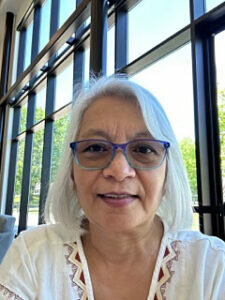In Bellingham, WA, ProLiteracy member program Whatcom Literacy Council is lucky to have Marcia Katigbak Church leading immigrant English language learners to success in their country. Marcia was lucky—when she immigrated to the US from the Philippines, she was educated and spoke English well. But she realized not everyone coming to this country had that same experience, so she stepped up to help.
Meet Marcia Katigbak Church.
The Basics
ProLiteracy: How long have you worked with Whatcom Literacy Council?
Marcia Katigbak Church: I have worked with Whatcom Literacy Council for 4.5 years.
P L: Why did you decide to start working with Whatcom Literacy Council?
L: Why did you decide to start working with Whatcom Literacy Council?
MKC: My husband and I moved to Bellingham after retirement, so I felt free to choose what I wanted to volunteer in. I immigrated to the US as an educated adult and did not really have difficulty adjusting, mainly because I speak English. I thought that helping immigrants learn English and helping in their adjustment would be a good way to give back to this country.
PL: What do you teach and in what setting?
MKC: I teach English as a second language in the One-to-One Tutoring Program. I meet my learner at the Whatcom Community College campus.
About Your Experience
PL: What have you learned about yourself by working with students?
MKC: I did not have experience teaching English when I started with WLC. But through training programs, webinars, and various resources, I learned that I can become a competent ELL tutor.
PL: Tell us about a favorite/impactful/memorable teaching experience.
MKC: I don’t have a particular experience to recount but want to share a general feeling of satisfaction when my learner’s improved language skills enable her to navigate her community (e.g., communicate with her child’s teacher, initiate conversations with her neighbors, feel confident talking with her business customers).
PL: How do you keep students motivated?
MKC: If a student has an immediate need for communicating in English, my student and I work on that first. For example, we can role-play before a coming parent-teacher conference. I also use different resources/media to work on learning/improving different skills. For example, NPR’s StoryCorps has stories we can listen to with accompanying text for practicing oral reading and learning new vocabulary. I also acknowledge the experiences that learners bring with them by choosing topics they know well (e.g., their country of origin, favorite dish to cook).
The Other Stuff
PL: Name someone who inspires you.
MKC: A hundred years ago, my maternal grandfather in the Philippines went to graduate school at Yale University as part of a push to establish higher education in the Philippines. During the same period, my paternal grandparents started a high school in our hometown in the Philippines that, to this day, continues to provide affordable education. So, I had no excuse to not be educated.
PL: Where would you go on your dream vacation?
MKC: I would like to see the Aurora Borealis.
PL: What is your favorite book of all time?
MKC: I have too many books worthy of mentioning! I remember reading Louisa May Alcott’s (1880) Little Women when I was young, and I got hooked into reading. It doesn’t mean that it’s [my] favorite book of all time.
PL: What are you reading now?
MKC: I just started Jonathan Franzen’s (2001) The Corrections after finishing Wallace Stegner’s (1943) The Big Rock Candy Mountain. I’m also reading Katie Holten’s (2023) The Language of Trees: A Rewilding of Literature and Landscape.
PL: What book do you like to recommend to your students?
MKC: I will probably recommend George Orwell’s (1949) 1984. But so far, reading the newspaper has been one of my more immediately achievable goals for my students.
Instructor Spotlight is a monthly feature on the ProLiteracy website and blog. Nominate an outstanding instructor from your program to be featured!